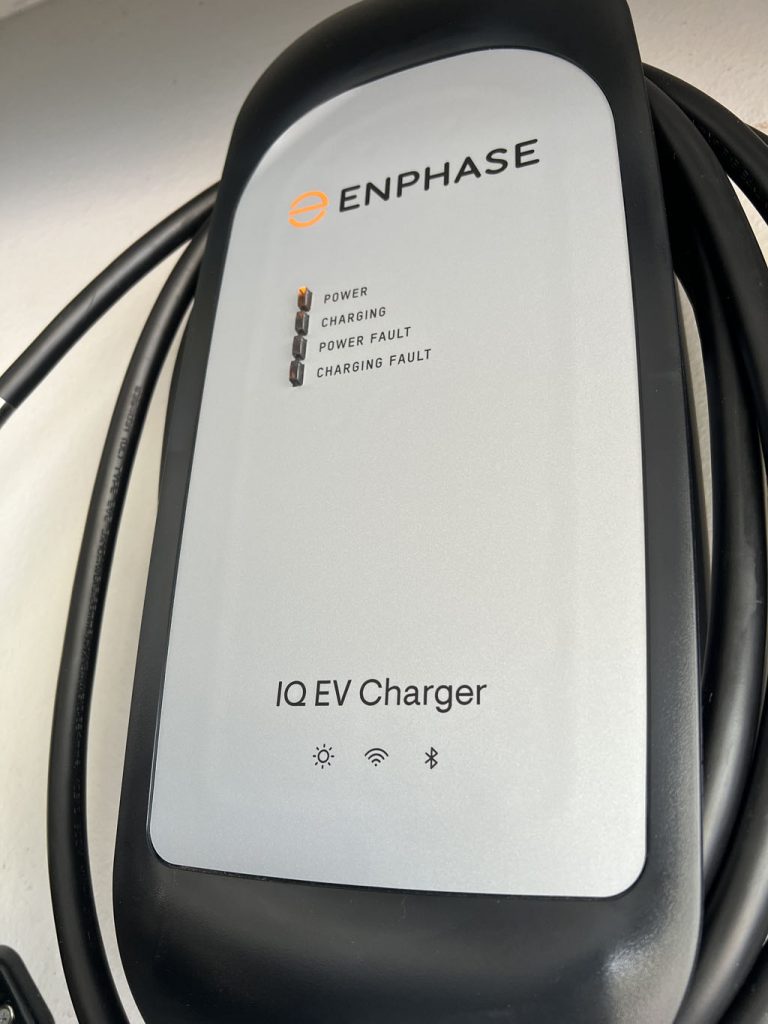
There’s an obvious shift in the focus of energy in the world, with electric vehicles (EVs) being at the forefront of such a debate. When it comes to attempting to be somewhat self-sustaining, having an EV is a big step, but you must have the proper equipment to support the goal of being energy-independent to a degree. Fortunately, companies like Enphase have made inroads to help households experience some energy independence, which I have done myself in having a home Solar system and the latest IQ EV Charger from Enphase.
I’ve had the opportunity to review countless new EVs and walked away learning something new each time leading to a belief in a viable future of EVs. In having EVs in for review, I required a home charging solution, which meant having a Level 2 charger installed. The choice for the charger this year happens to be a unit from Enphase, called their new IQ EV Charger, which seamlessly connects to my Enphase home solar system over Wi-Fi. The major benefit of the new Enphase IQ EV Charger over my previous Enphase HCS-50 charging unit, is the Wi-Fi connectivity and integration with the Enphase home solar system and mobile app. Such an integration allows you to set the IQ EV Charger to fundamentally charge exclusively from energy generated by your solar panels instead of energy from the power grid, or utilize a combination of grid power. Such a unique feature means that you could technically charge your EV for free using only solar energy all at the fingertips of using the same Enphase mobile app for your home solar system.
Also, don’t forget that you can get discounted new car pricing with a free quote through qualified local dealer partners.
Installation of the Enphase IQ EV Charging unit was nearly as simple as plugging up your EV to charge and setting up a few features on the Enphase mobile app. After installing the unit on my garage wall, in the same spot that I had my previous Enphase HCS-50 Level 2 charger installed, I was able to simply scan a QR code on the unit, verify some information, and then bring up my current Enphase mobile app on my iPhone that I use for my solar system. From there, the Enphase app automatically added my IQ EV Charging unit to its interface where you see how it will read out the live power usage and status of charging an EV. There was very little configuration or change of settings. The app allowed the IQ EV Charging unit to connect and display its current status, including the integration of power usage with my Enphase home solar system.
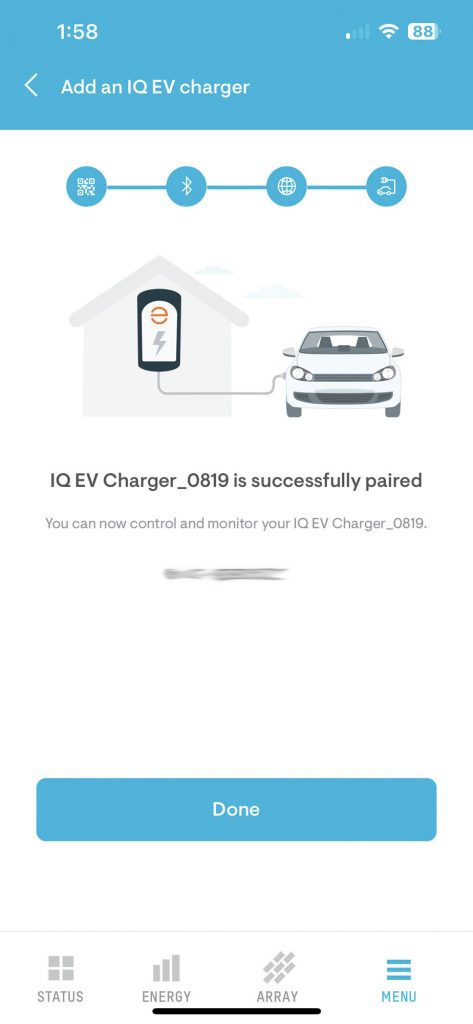
By default, the Enphase IQ EV Charger unit, after properly setup after installation to integrate with your Enphase solar system, charges your EV during the day using solar energy. However, the simplified settings through the Enphase mobile app allow you to easily switch the IQ EV Charger to charge at night on a schedule, potentially taking advantage of energy savings for some areas when the power usage rates are at their lowest during off-peak times.
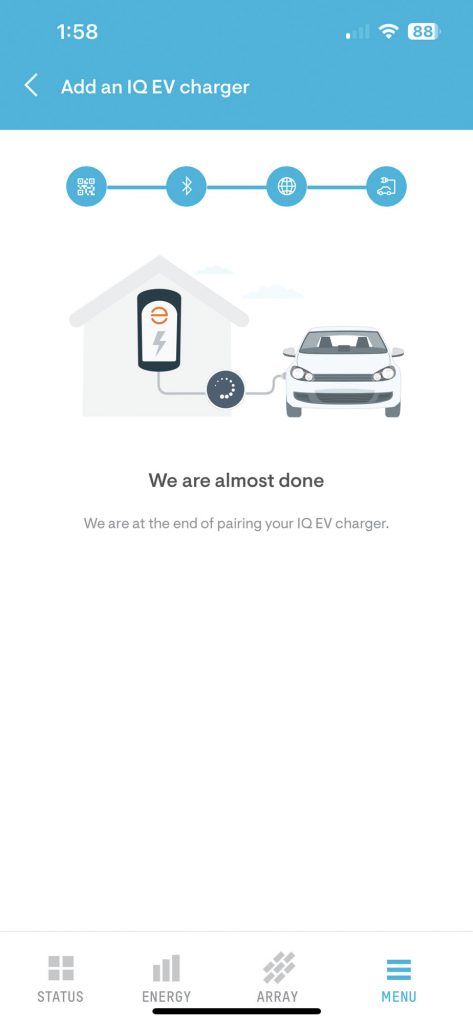
Using the Enphase EQ EV Charging unit, which is a 40-amp model with the NEMA 14-50 male plug, is a simple endeavor. My 50-amp NEMA 14-50 outlet and circuit is the recommended connection for the charging unit I have, and it provides enough power to sustain a rate of around 9.6 kW on most EVs. That equates to up to about 38 miles per hour of range added to an EV battery.

The Enphase software, just like when using it for your home solar system, is intelligent in that it has a Storm Guard system that automatically enables upon the detection of severe weather headed to your location. The Storm Guard also applies to your EV charging automatically with the IQ EV Charging unit. If your EV is connected to the charger and a storm is headed your way, the Storm Guard will automatically charge up your EV before the storm hits to provide you with a charge ahead of a looming power outage at your house.
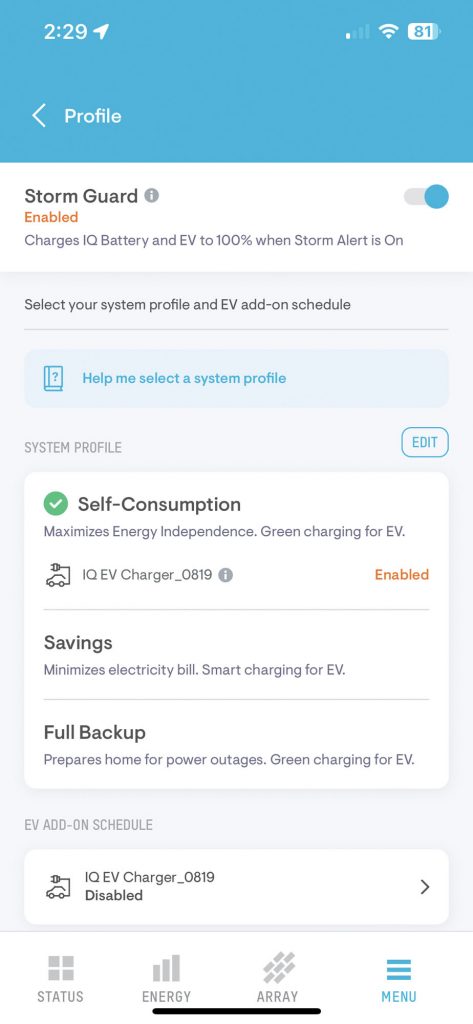
The J1772 connector feels robust enough to stand the test of time and is claimed to be impact-resistant. Moreover, the unit is sealed and weatherproof and covered by a 5-year limited warranty.
During charging sessions when the sun is out, the IQ EV charging unit will automatically utilize the power from your solar panels to charge an EV. When the sun is blocked by clouds or begins to set, providing you with less solar panel power, the output to the EV declines as well, which seems to be one of the pitfalls of such a setup when leaving it in its default setting. However, when switching the unit to charge utilizing grid power, the solar power is often prioritized to provide power, but the grid energy is automatically supplemented to offer a full-rate charge to the EV. Basically, if left to the default setting, the charger will not charge during the night. You will have to manually toggle to charge at night utilizing grid power, but you may do it under a set schedule to use off-peak energy and a potentially lower rate/cost. Surprisingly, the Enphase app is smart enough to display an alert asking if you wish to switch over to grid power to charge your EV upon detection of little to no solar panel power being generated.

In all, the Enphase IQ EV Charger is a remarkable benefit for taking advantage of your solar energy, which in turn could permit you to charge up only using solar energy. Essentially, by the Enphase IQ EV Charger using excess solar panel energy throughout the daytime, you may have sessions to grant you a free charge if your system provides enough energy throughout the day. Moreover, with a backup battery system, which I have installed as part of my home solar system, you can extend your EV charging via the IQ EV Charging unit when the sun goes down or when solar panel power is limited. Basically, the home backup battery can serve to help charge your EV, too, though at a much lower rate, nearly up to the 3.8-kW rate that my 10-kWh home battery provides.
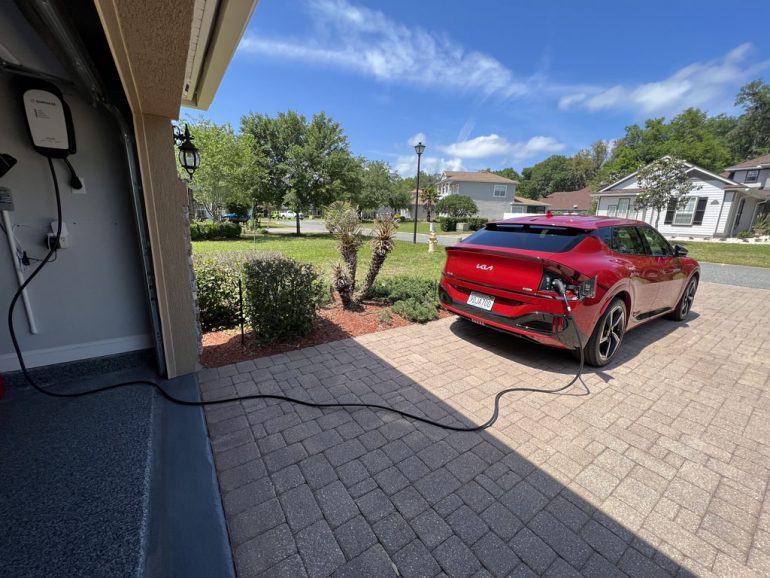
One caveat I did notice for my specific solar system because my backup battery recharges through some of the morning when the sun rises, the energy to charge it is limited, while the IQ EV Charging unit prioritizes charging up the connected EV – unless you modify the settings to utilize grid energy for recharging the home battery. Moreover, if your house utilizes heat or air-conditioning often throughout the daytime, you may need to utilize grid energy with excess solar to charge your EV using the IQ EV Charger unit. Fortunately, the Enphase software will automatically sort out the energy usage, which is yet another benefit to such a charging unit that’s ultimately something that will pay for itself within its first year of usage if you charge your EV often.
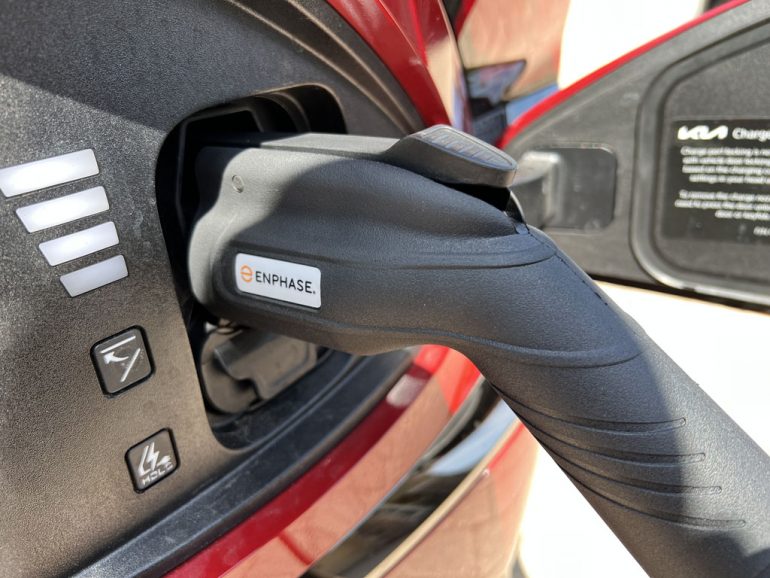
The paying-for-itself scenario covers the $835 price of the unit I have, which is the Enphase IQ 50 EV Charger in the 40-Amp Model with the NEMA 14-50 plug option.
The IQ EV Chargers are available in various power levels starting at $732, ranging from 32 amperes to 64 amperes, providing users with hardwired and plug-in options based on their specific requirements.
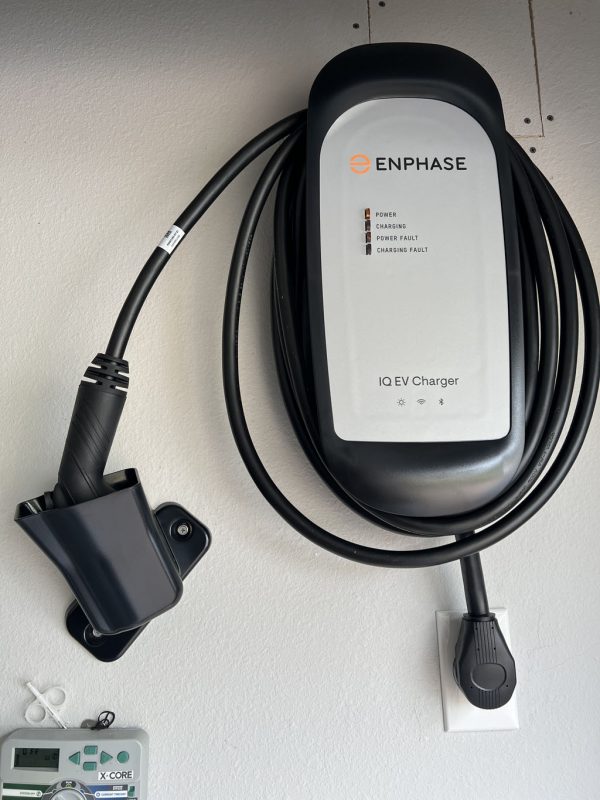
Safety is a paramount consideration in Enphase’s design, as evidenced by the ETL safety certification for all their EV charging solutions. Enphase provides peace of mind to customers with a 5-year limited warranty and round-the-clock customer support, underscoring the company’s commitment to quality and customer satisfaction.